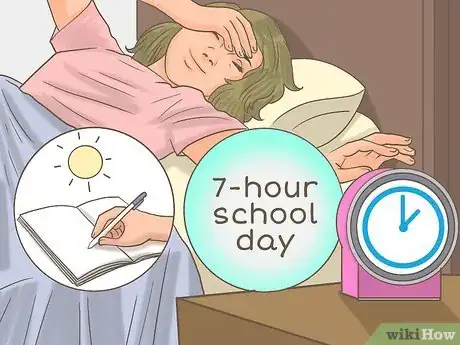This article was co-authored by Jake Adams. Jake Adams is an academic tutor and the owner of Simplifi EDU, a Santa Monica, California based online tutoring business offering learning resources and online tutors for academic subjects K-College, SAT & ACT prep, and college admissions applications. With over 14 years of professional tutoring experience, Jake is dedicated to providing his clients the very best online tutoring experience and access to a network of excellent undergraduate and graduate-level tutors from top colleges all over the nation. Jake holds a BS in International Business and Marketing from Pepperdine University.
There are 13 references cited in this article, which can be found at the bottom of the page.
This article has been viewed 64,226 times.
It’s normal to feel nervous about making the switch from homeschooling to a traditional high school. You’re not alone! Homeschooled or not, starting high school is a major adjustment for all students. Stay positive, have confidence, and don’t worry too much about the social transition since the classroom environment will be a cool new part of your school experience.[1] Handling registration and academic logistics does take a little work, but try not to get overwhelmed. Your homeschool association and school district can help you and your parents navigate the process.
Steps
Dealing with the Social Transition
-
1Take part in a variety of social activities before enrolling in high school. If you’re homeschooled, you’re probably all too familiar with misconceptions about homeschooling and socialization. Like most homeschooled kids, you may already do community service, participate in extracurricular activities with a nearby traditional school, or take part in a homeschool co-op. As high school approaches, stay involved in social activities to help you prepare for the transition.[2]
- If you’re not already involved in social activities, talk to your parents about joining a club or sport team with your local public school.
- There are many bridge programs where you can be gradually introduced into classrooms.[3]
- You can also see if there are grammar, science, or math workshops offered at nearby schools over the summer where you can get used to learning with large groups of other kids.[4]
- Most homeschooled kids interact with lots of people within and outside of their age range. Have confidence in yourself and your social skills, and don’t buy into negative stereotypes.
-
2Spend time with people whose views differ from your own. Meeting people with radically different viewpoints is one challenge some homeschooled kids face in high school. Look for opportunities to talk to people with different backgrounds and beliefs. Bring up the subject up with your parents and brainstorm ways you can get to know people whose ideas differ from your own.[5]
- Whether academic or religious in nature, the decision to homeschool can involve philosophical or religious beliefs. Not everyone shares those beliefs, so it’s helpful to work on discussing differing opinions respectfully, even when someone challenges your point of view.
Advertisement -
3Remember that starting high school is a big adjustment for all students. Try not to feel like you’re the only one who’s nervous about starting high school. Do your best not to put pressure on yourself. Take comfort in the fact that you’re not the only one trying to figure out your new surroundings.[6]
- Homeschooled or not, everyone gets butterflies in their stomach on the first day of high school. Stay positive, and remind yourself that you’ll adjust to your new school before you know it.
-
4Don’t give into negative peer pressure. All teens have to deal with peer pressure in high school, whether they went to a traditional middle school or were homeschooled. Try not to be too concerned about looking cool, and don't worry about people judging you for being homeschooled. Be proud of yourself, and remember that a true friend wouldn’t pressure you to do anything risky.[7]
Tip: Think of how to respond to peer pressure ahead of time. For instance, you could come up with a casual excuse, like, “No, I have practice early tomorrow, so I can’t go to the party,” or “I need my lungs in top shape for my recital next week, so there’s no way I’m gonna try smoking!”
-
5Talk openly with your family about the transition. Once you start school, let your parents know how things are going. Try to have regular check-ins, such as during drives home from school or at the dinner table. They’re going through an adjustment, too, so communicating openly as a family can help you all navigate the transition.[8]
- Whether you’re dealing with a bully or are stressed out about your schedule, it’s better to talk to someone than bottle up your feelings.
- That said, some issues aren’t easy to talk about with your parents. If you need to talk, reach out to a trusted adult, such as an aunt or uncle, teacher, or school guidance counselor.[9]
Handling the Logistics
-
1Notify your local homeschool association and ask for resources. If you’re involved in a homeschool association, your parents should notify the president that you’ll be enrolling in a traditional high school. Additionally, the association can most likely provide information about formatting your academic records, submitting documents, and communicating with school department officials.[10]
- Transferring from homeschool to a traditional high school is sometimes complicated, so it’s wise to start the process at least a year before you plan on enrolling.
-
2Contact your school district for specific registration steps. The exact steps depend on your location and whether you want to enroll in a public or private high school. You and your parents should visit your local department of education or school district website. There, you can identify your local public school, find registration information, and learn about specific requirements for homeschooled students.[11]
- If you’re applying to a private high school, check with the school’s admissions department.
-
3Submit your required documents by the due dates. In general, you’ll need to submit an academic record, such as report cards or a transcript, prepared by your parents or tutor. Most likely, your parents will also need to complete registration forms and submit copies of your birth certificate and proof of residency.[12]
- Your local jurisdiction’s vaccination standards may differ for traditional and homeschooled students. If so, you may also need to get additional vaccines and provide the school district or high school with verification from your doctor.[13]
- Registration typically runs prior to the start of the school year from late winter or early spring through summer. Depending on your location, your parents will either send the required documents to the school district or to your intended high school.
-
4Visit the school, attend all available orientations, and sit in on classes. Navigating a new school, dealing with lockers, and getting to class on time aren’t as simple as they seem. The year before you enroll, arrange with the school to take a tour and shadow a current student. Additionally, take advantage of any and all new student orientations before the first day to become as familiar as possible with your new school.[14]
Tip: Check out your new high school’s website and social media pages. Look for maps, lists and pictures of teachers, news, and information about extracurricular activities. Studying up may help you find your bearings and keep your cool on the first day of school.[15]
Adapting to Academic Changes
-
1Take a standardized test to receive academic credit. Most school districts don’t require standardized testing for homeschooled students, but taking at least one is wise. A transcript prepared by your parents doesn’t carry as much weight as a state or nationally accredited standardized test. To find and register for a test, check your school department website’s homeschooling resources page or consult your homeschooling association.[16]
- The test will help your new school properly place you at the right grade level. It’ll also help ensure your high school accepts your academic credit, which is especially important if you’re transferring as an upperclassman.
- Additionally, you may have trouble being placed in advanced courses without standardized test scores.
-
2Keep detailed records of transcripts and report cards. Your parents need to report the coursework required by your school district, which generally includes reading, writing, math, science, and social studies. Physical education, art, music, and foreign language may also be required, and the grading system your parents use must be consistent with that of the district.
- Your homeschool association can give your parents tips on formatting a transcript or report card and meeting your school district’s requirements.
- Dealing with logistical hurdles can be a lot to process, but you and your parents shouldn’t get overwhelmed or discouraged. Most of the time, homeschooled students perform at a higher grade level than traditional students.
Tip: If the school gives you any trouble about grade or course level placement despite your great test scores, your parents should politely ask them to keep your best interests in mind. If necessary, they may be able to appeal the school's decision either internally or through the district.[17]
-
3Establish a traditional school routine, if you haven’t already. You may be used to starting school later in the day or completing coursework on nights and weekends. If so, you and your parents or tutor switch to a more traditional schedule during the year before you start high school. Wake up earlier, stick to a 7-hour school day, and get used to doing homework at set times outside of normal school hours.[18]
- Adjusting to a traditional school schedule will be easier if you give yourself plenty of time to make the transition. Your grades may suffer if you start school and suddenly have to wake up earlier or aren’t used to a traditional school schedule.
-
4Work on keeping track of your time and assignments. If you don’t already have one, get an agenda to budget your time and track assignments. Write down your deadlines, estimate how long tasks will take, and plan out your daily and weekly schedules.[19]
- Learning how to budget time is important for all rising high schoolers. Honing your organizational skills is especially important if you’re used to a more fluid schedule.
- Additionally, if you’re not used to taking timed tests, your parent or tutor should include them in your curriculum in the year before you start high school. Work on checking the clock, budgeting time for each test section, and balancing efficiency and accuracy.[20]
-
5Communicate with your teachers openly and respectfully. Maintain open lines of communication with your teachers, and check in with them regularly. If something isn’t clear, don’t hesitate to ask for a little extra help. Try not to be shy around them; remember, their job is to make sure you get the best education possible![21]
- After class, for instance, you could ask a teacher, “I’m having trouble with today’s physics lesson. Can I stop by your classroom after school some time this week for extra help?”
- While some teachers are more formal than others, remember that you should always address teachers and other school staff with respect.
- If, by chance, you feel like a teacher is treating you unfairly, get help from your parents or another trusted adult instead of speaking to the teacher rudely.
-
6Interact with your peers confidently and clearly during group projects. Group assignments can be intimidating if you’re used to working independently. Try to focus on the project at hand, what you bring to the table, and how to delegate tasks fairly and effectively.[22]
- When it comes to delegating, ask if anyone has an interest or expertise in a given task. For tasks no one wants to do, suggest a fair solution, such as drawing straws.
- If you feel like the group is veering off topic, say, “We have a lot of good ideas here, but maybe we need more focus. Lets try to prioritize. What do you think are our strongest 2 or 3 ideas?”
Expert Q&A
-
QuestionHow do I go back to public school after homeschooling?
 Jake AdamsJake Adams is an academic tutor and the owner of Simplifi EDU, a Santa Monica, California based online tutoring business offering learning resources and online tutors for academic subjects K-College, SAT & ACT prep, and college admissions applications. With over 14 years of professional tutoring experience, Jake is dedicated to providing his clients the very best online tutoring experience and access to a network of excellent undergraduate and graduate-level tutors from top colleges all over the nation. Jake holds a BS in International Business and Marketing from Pepperdine University.
Jake AdamsJake Adams is an academic tutor and the owner of Simplifi EDU, a Santa Monica, California based online tutoring business offering learning resources and online tutors for academic subjects K-College, SAT & ACT prep, and college admissions applications. With over 14 years of professional tutoring experience, Jake is dedicated to providing his clients the very best online tutoring experience and access to a network of excellent undergraduate and graduate-level tutors from top colleges all over the nation. Jake holds a BS in International Business and Marketing from Pepperdine University.
Academic Tutor & Test Prep Specialist See if there are any bridge programs or summer workshops you can take so you get used to being in a classroom and socializing with peers beforehand. This can make the transition easier!
See if there are any bridge programs or summer workshops you can take so you get used to being in a classroom and socializing with peers beforehand. This can make the transition easier! -
QuestionHow do I avoid getting into trouble at school?
 Ashley Pritchard, MAAshley Pritchard is an Academic and School Counselor at Delaware Valley Regional High School in Frenchtown, New Jersey. Ashley has over 3 years of high school, college, and career counseling experience. She has an MA in School Counseling with a specialization in Mental Health from Caldwell University and is certified as an Independent Education Consultant through the University of California, Irvine.
Ashley Pritchard, MAAshley Pritchard is an Academic and School Counselor at Delaware Valley Regional High School in Frenchtown, New Jersey. Ashley has over 3 years of high school, college, and career counseling experience. She has an MA in School Counseling with a specialization in Mental Health from Caldwell University and is certified as an Independent Education Consultant through the University of California, Irvine.
School Counselor Just be respectful to everyone you interact with, even if it's really hard and you aren't used to it. Be mindful of your actions and don't be too impulsive. Other than that, just watch what you say and you'll be fine!
Just be respectful to everyone you interact with, even if it's really hard and you aren't used to it. Be mindful of your actions and don't be too impulsive. Other than that, just watch what you say and you'll be fine! -
QuestionWhat should I do if I'm very shy?
 Community AnswerTry practicing things you might want to say when you are alone and feel less pressure. For example, you can practice introducing yourself and making small talk. You can also try looking for any after-school clubs you think you would enjoy attending, and sign up for one. It is easier to meet people when you all have a club activity to focus on as well.
Community AnswerTry practicing things you might want to say when you are alone and feel less pressure. For example, you can practice introducing yourself and making small talk. You can also try looking for any after-school clubs you think you would enjoy attending, and sign up for one. It is easier to meet people when you all have a club activity to focus on as well.
References
- ↑ Jake Adams. Academic Tutor & Test Prep Specialist. Expert Interview. 24 July 2020.
- ↑ http://www.pbs.org/parents/education/homeschooling/socialization-tackling-homeschoolings-s-word/
- ↑ Jake Adams. Academic Tutor & Test Prep Specialist. Expert Interview. 24 July 2020.
- ↑ Jake Adams. Academic Tutor & Test Prep Specialist. Expert Interview. 24 July 2020.
- ↑ http://www.pbs.org/parents/education/homeschooling/reentry-when-homeschool-students-enroll-in-traditional-schools/
- ↑ Ashley Pritchard, MA. Academic & School Counselor. Expert Interview. 4 November 2019.
- ↑ https://kidshealth.org/en/teens/peer-pressure.html
- ↑ https://kidshealth.org/en/kids/homeschool.html
- ↑ https://kidshealth.org/en/kids/bullies.html
- ↑ https://www.homeschoolingsc.org/enroll-your-child-back-in-school/
- ↑ https://www.lcps.org/cms/lib/VA01000195/Centricity/Domain/11573/home-instruction-handbook%202018.pdf
- ↑ https://tea.texas.gov/Texas_Schools/General_Information/Finding_a_School_for_your_Child/Home_Schooling/
- ↑ https://www.lcps.org/Page/78848
- ↑ http://www.pbs.org/parents/education/homeschooling/reentry-when-homeschool-students-enroll-in-traditional-schools/
- ↑ https://homeschoollifemag.com/blog/2017/11/9/qa-tips-for-transitioning-from-homeschooling-to-public-high-school
- ↑ https://tea.texas.gov/Texas_Schools/General_Information/Finding_a_School_for_your_Child/Home_Schooling/
- ↑ https://www.homeschoolingsc.org/enroll-your-child-back-in-school/
- ↑ https://homeschoollifemag.com/blog/2017/11/9/qa-tips-for-transitioning-from-homeschooling-to-public-high-school
- ↑ https://homeschoollifemag.com/blog/2017/11/9/qa-tips-for-transitioning-from-homeschooling-to-public-high-school
- ↑ http://www.pbs.org/parents/education/homeschooling/reentry-when-homeschool-students-enroll-in-traditional-schools/
- ↑ Ashley Pritchard, MA. Academic & School Counselor. Expert Interview. 4 November 2019.
- ↑ https://bokcenter.harvard.edu/group-work
- ↑ https://kidshealth.org/en/kids/bullies.html



















-Step-12.webp)



















-Step-12.webp)



































